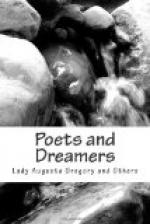And another old man said: ’When I was a young chap knocking about in Connemara, I often heard songs about the Stuarts, and talk of them and of the blackbird coming over the water. But they found it hard to get over James making off after the Battle of the Boyne.’ And another says of James: ’They liked him well before he ran; they didn’t like him after that.’
And when I looked through the lately gathered bundle of songs again, and through some old collections of Jacobite songs in Irish, I found they almost all belonged to Munster. And if they are still sung there, it is not, I think, for the sake of the kings, but for the sake of the poets who made them—Red-haired Owen O’Sullivan, potato-digger, harvestman, hedge-schoolmaster, whose poems are still the joy of the Munster people; O’Rahilly, more learned, and as boundlessly redundant; O’Donnell, whose heart was set on translating Homer into Irish; O’Heffernan, the blind wanderer; and many others. For the Munstermen have always been more ‘prone to versify’ than their leaner neighbours on the bogs and stones of Connaught.
There is a common formula for most of these songs or ‘Visions,’ Aislinghe, as they are called. Just as artists of to-day find no monotony in drawing Ireland over and over again with her harp, her wolf-dog, and her round tower, so the Munster poets found no monotony in representing her as a beautiful woman, white-skinned, with curling hair, with cheeks in which ‘the lily and the rose were fighting for mastery.’ The poet asks her if she is Venus, or Helen, or Deirdre, and describes her beauty in torrents of alliterative adjectives. Then she makes her complaint against England, or her lament for her own sorrows or for the loss of her Stuart lover, spoken of sometimes as ‘the bricklayer,’ or ‘the merchant’s son.’ The framework is artificial; but the laments are often very pathetic the love of Ireland, and the hatred of England born of that love, finding expression in them.
John O’Donnell sees her ’like a young queen that is going astray for the king being banished from her, that had a right to come and set her loose.’ O’Rahilly, in one of his poems, shows the beautiful woman held to her Saxon lover by some strange enchantment:—
’I met brightness of brightness upon the path of loneliness; plaiting of plaiting in every lock of her yellow hair. News of news she gave me, and she as lonely as she was; news of the coming back of him that owns the tribute of the king.
’Folly of follies I to go so near to her; slave I was made by a slave that put me in hard bonds. She made away from me then, and I following after her, till we came to a house of houses made by Druid enchantments.
’They broke into mocking laughter, a troop of men of enchantments, and a troop of young girls with smooth-plaited hair. They put me up in chains; they made no delay about it; and my love holding to her breast an awkward




